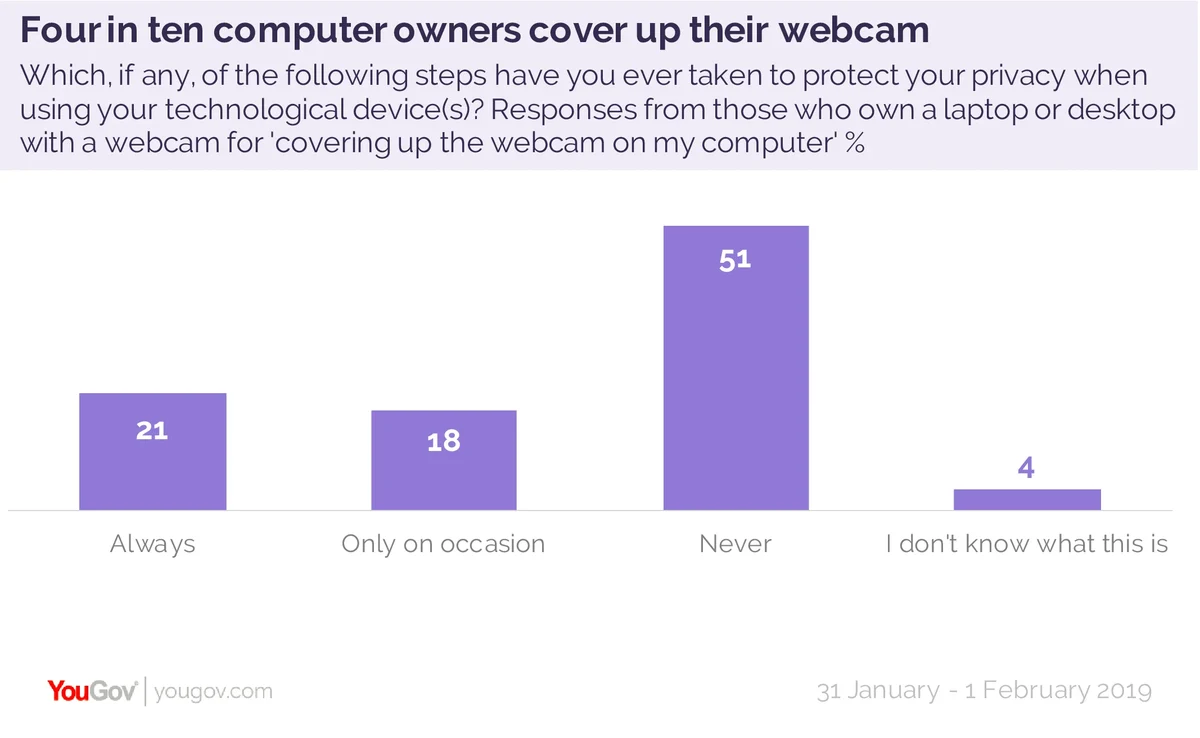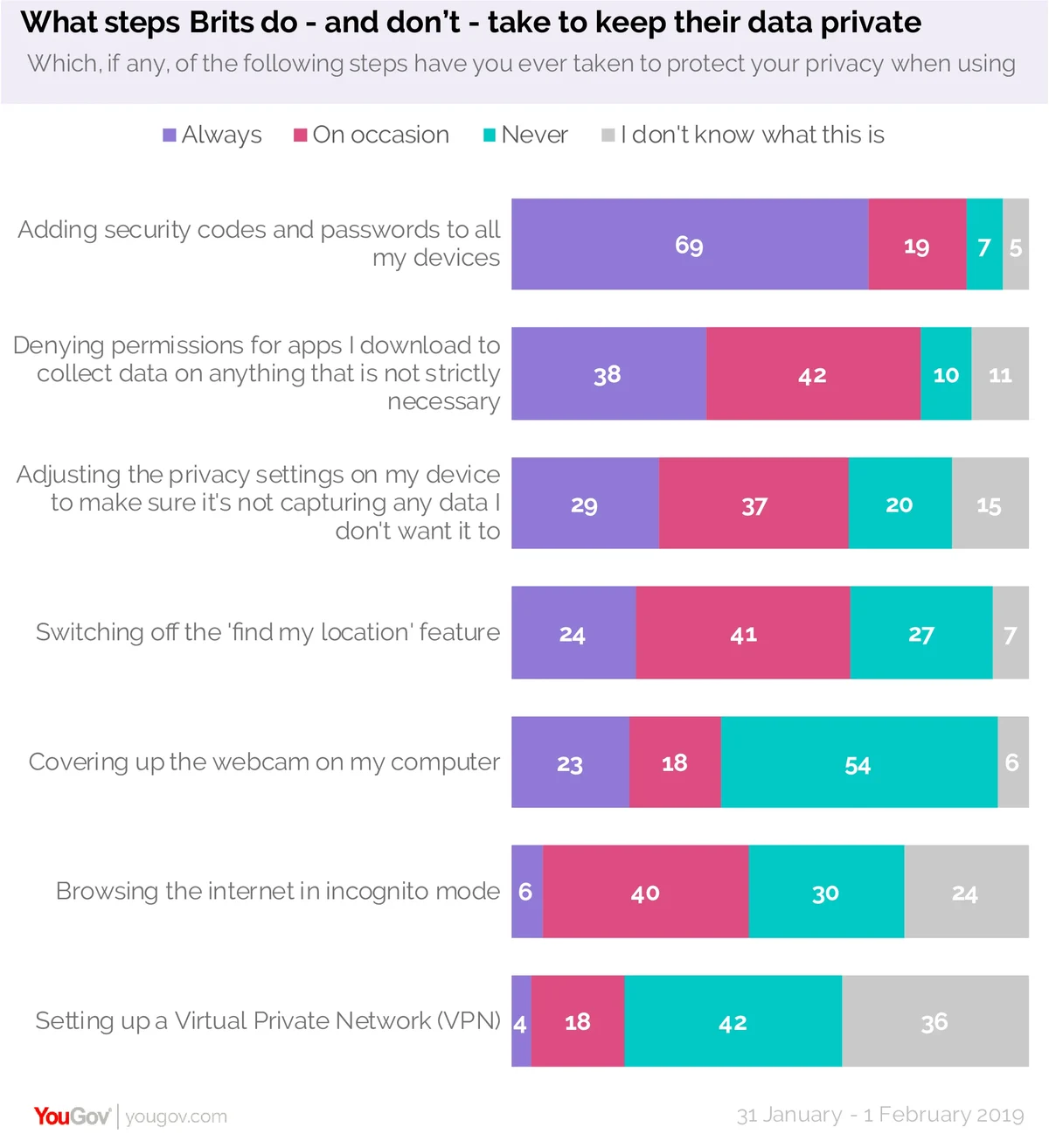Most Britons (71%) believe that companies record our data without consent via our own phones and laptops - but how many are doing anything about it?
A new YouGov Custom survey explores what steps Britons take to guard themselves from prying eyes - whether they belong to hackers or legitimate technology companies.
Four in ten computer owners cover up their webcam
Although hackers spying on you via your own webcam is a technical problem, the solution is as simple as a piece of masking tape over the lens. Facebook’s Mark Zuckerberg does it. US government offices do it. And more and more tech security experts recommend it.
YouGov's survey shows that four in ten of those who own a desktop or laptop with a webcam cover it up. Around half of them (18%) do so on occasion, while one in five (21%) have it blocked permanently.

We also asked whether people think tech companies record us without consent. Seven in ten Brits (71%) think they do, and just over half (56%) think it’s a problem. One in nine (11%) don’t believe they do.
Interestingly, one in four (25%) of those who do not think tech companies do this still cover up their webcam. Just in case.
PINs & passwords
Smartphones and laptops manage our lives: family photos, personal and work emails, online banking, shopping… So keeping our phones secure is more important than ever.
Despite this, our survey shows that one in four smartphone (26%) and laptop (25%) users do not always have passwords and security codes on their devices.
For both devices one in five (19%) only set passwords on occasion, while around one in fifteen (7% smartphone, 6% laptop) never bother.
Privacy settings
Two thirds of Britons (64%) adjust privacy settings on their devices to make sure they’re not capturing any data they don't want them to, like giving access to their contacts or their location. But one in five (19%) never do, and one in six (14%) don’t know what this means.
Those who own a smart device, such as a smartwatch, are considerably more likely than average to adjust their privacy settings – around 75% do so, compared to 64% of smartphone and laptop users.
Adjusting app permissions
Just over a third of smartphone users (38%) always deny permissions for apps they download to collect data on anything that is not strictly necessary for using the app. For instance, an app that requests access to your contact book or photo library.
Four in ten (42%) only adjust these permissions on occasion. One in twelve (9%) never do, and one in ten (10%) don't understand what this means.
'Incognito' mode
'Incognito mode' is a feature which automatically deletes your browsing history and prevents websites storing cookies on your computer, which allow them to track your visits and more accurately target advertising. It doesn’t allow secret browsing - the websites and your service provider still know what you’ve viewed - but it does help protect your privacy.
One in twenty Brits (5%) 'always' browse the internet in incognito mode. Four in ten (39%) do so on occasion.
One in four (23%) don't know what it is, rising to a third (29%) of those aged 65 and above - of whom six in ten (57%) own a computer.
Women are more than twice as likely as men to say they do not know what incognito mode is (14% men, 32% women).
Virtual Private Networks (VPN)
If you really want to keep your internet usage under the radar, a Virtual Private Network is a step up from private browsing. It ensures that none of the data flowing between your device and the internet is logged by outside sources.
One in twenty-five Brits (4%) always use a VPN when browsing online. Another one in six (16%) do so on occasion, rising to one in four (25%) among 18 to 24 year olds. A third (33%) don't know what it is..
Find my location
One in four Brits (27%) never switch off the 'find my location' feature on their device. Another one in four (24%) always do, and four in ten (40%) do so on occasion.

Are companies really spying on us?
Failing to take basic steps to protect your data and privacy could leave you vulnerable to hackers - but what about legitimate companies? How many people believe that the internet giants also listen to us without consent?
One in nine Brits (11%) don't think companies record people's private conversations without consent. Younger Britons are even more likely to trust them: 18% don’t think they spy on us, compared to just 7% of those aged 65 and above.
One in six Brits (15%) believe firms do record our day-to-day conversations without our consent, but don't think it’s a problem – so a total of one in four (26%) people either don't think this is happening, or aren't worried about it.
However, the majority of people are slightly more concerned. Just under six in ten (56%) do believe that companies record people's day to day life, and see it as an issue – though this falls to just under half (45%) of 18 to 24 year olds.
One in six Brits (14%) don't know, with women twice as likely as men to say so (9% men, 19% women).
If you’d like to read up on how to stay safe online and in the digital world, take a look at Get Safe Online, a public/private partnership website providing free advice on protecting yourself and your devices.
Photo: Getty
See the full results here









